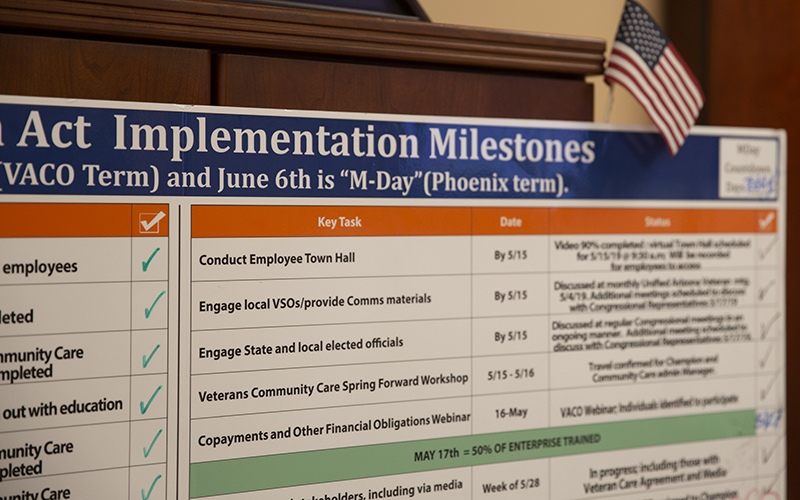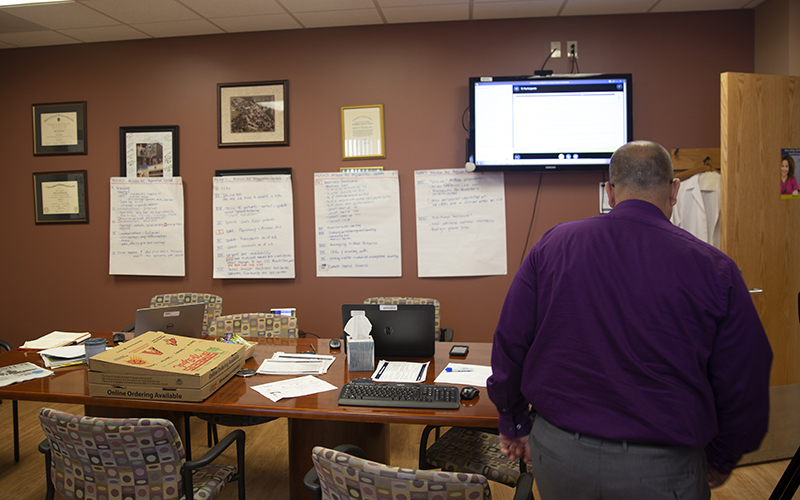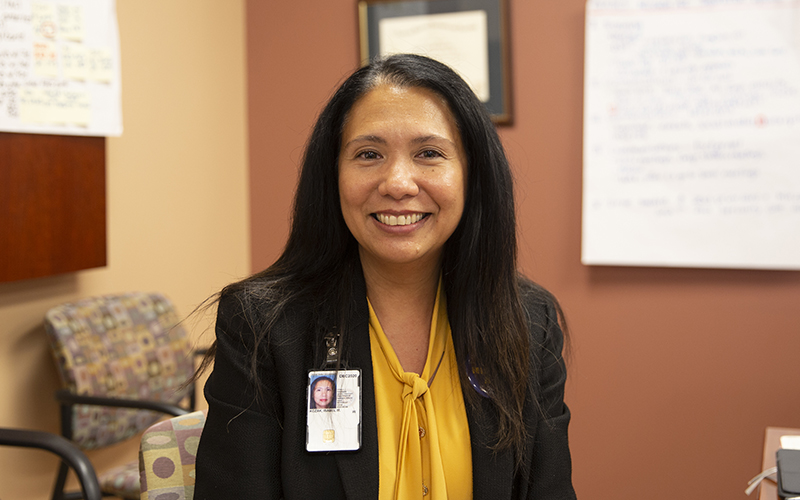
This board at the Phoenix VA “command center” shows the goals of the MISSION Act for staff members. The VA in Phoenix is working to help veterans with questions about the new Community Care Program and deal with technical issues. (Photo by Dylan Simard/Cronkite News)

The Phoenix VA Health Care System set up a “command center” to help veterans who might have problems signing up for the new Community Care Program and to answer questions. The rollout of the new MISSION Act coincided with the 75th anniversary of D-Day. (Photo by Dylan Simard/Cronkite News)

Isabel Kozak, who is the assistant chief of staff for Community Care at the Phoenix VA, says the goal of the new health care options is to make sure that veterans get the care they need in a timely fashion. (Photo by Dylan Simard/Cronkite News)
PHOENIX – The more than 500,000 military veterans in Arizona now have greater access to health care options beyond those available from the Department of Veterans Affairs. A nationwide program that took effect Thursday expands the circumstances under which veterans can access care outside the VA system.
“It’s going to allow veterans to access the health care that they need faster,” said Army veteran James Denton, who’s among more than 72,000 veterans in Phoenix.
The new Veteran Community Care program, which was outlined in the 2018 MISSION Act, sets new criteria for veterans to get treatment from private-sector providers. For example, if a veteran needs specialty care not offered through the VA, he or she can go to a specialist outside the system.
“The changes not only improve our ability to provide the health care veterans need, but also when and where they need it,” VA Secretary Robert Wilkie said in a statement. “It will also put veterans at the center of their care and offer options, including expanded telehealth and urgent care, so they can find the balance in the system that is right for them.”
On Thursday, the Office of Information and Technology for the VA set up a room at the Carl T. Hayden Veterans’ Administration Medical Center in Phoenix to answer questions that veterans might have, as well as assist in the online enrollment process for the Community Care Program. The process went well, according to OIT staff, who were sent on similar assignments around the country to facilitate the transition.
The program replaces the Veterans Choice Program, which allowed veterans to seek health care from select private providers if care was not available at a VA medical facility within certain “access standards,”such as timeliness, driving distance and specific services. Under the new program, veterans will have easier access to private care facilities and treatments because those standards have been greatly relaxed, including changing the timeliness standard from 30 days to 20 days for the primary care wait time.
For Arizona veterans, many of these services will be provided by TriWest Healthcare Alliance, which is based in Phoenix. Health care provided outside the VA would be paid for at the Medicare rate with few exceptions, according to a representative from the Phoenix VA.
Denton, who is vice president of the Fort Tuthill Military Museum in Flagstaff, called the changes smart and said veterans will be treated met more quickly.
“If you can reach out to these community partners and these community health care facilities … and they have the availability to take the patient and see them sooner – say five days or seven days or once it’s been approved – I think that’s a good thing. The veteran gets seen faster.”
The MISSION Act also covers urgent care at participating facilities.The coverage would be reserved for veterans of a higher priority level (meaning they require more medical attention,) but it would still cover several visits a year without having to notify the VA.
With all the changes, the VA wants veterans to be clear on two points. First, veterans will still have choice in their providers, and under the new program veterans will have more choice. Second, although the new program increases reliance on the private health care sector, the VA isn’t financing private health care for veterans. The focus remains on providing care at VA health centers, and the Community Care Program is meant to increase veterans’ access to health care.
“We do have a mandate. It’s not just that you can come here and go out to the community,” said Isabel Kozak, the assistant chief of staff for community medicine at the Phoenix VA Health Care System. “We have services here. So if we can see you within a certain access parameter, then we give you the care over here. It’s when we can’t get to you – we don’t want veterans not to get care.”
It isn’t clear how the program will affect usage of the VA health center.
“I really don’t know,” Kozak said. “We would like veterans to be informed, number one. We want them to know what the eligibility is, we want them to come here, and we want them to have a really thoughtful discussion with their provider.”
Follow us on Twitter.